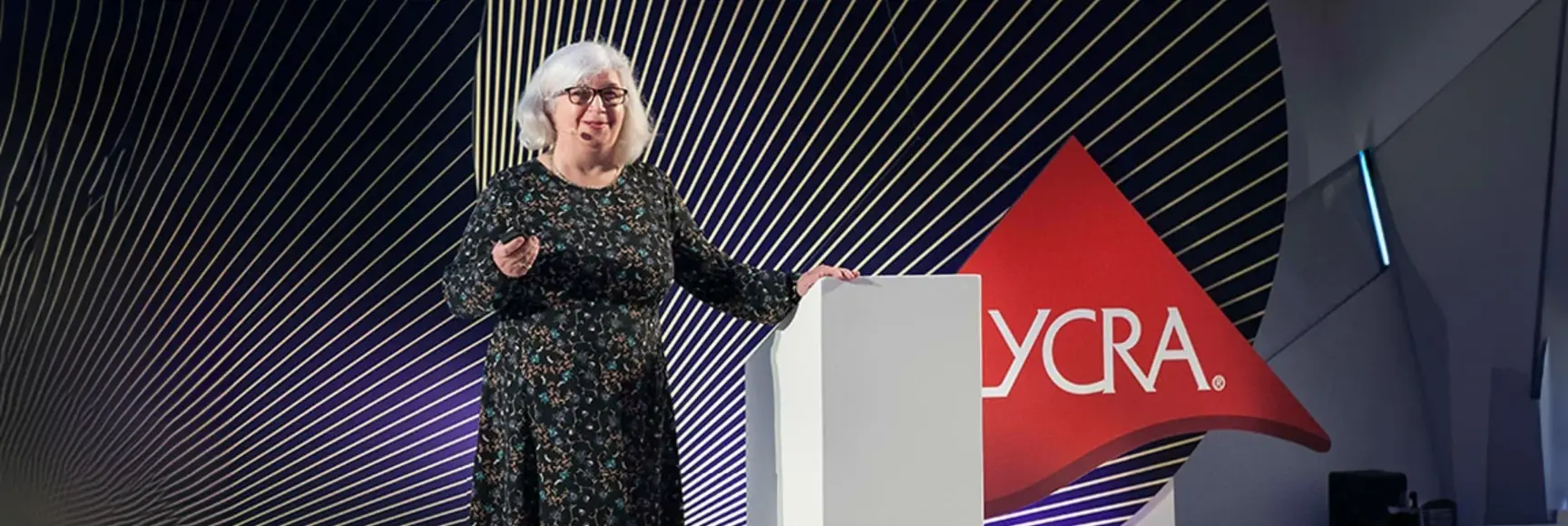MISSION: PERFECT PANTYHOSE
In the latest installment of our Voice of the Expert series, we speak to Sybille Bald, a hosiery industry expert and 35-year veteran of The LYCRA Company, about her career-long mission to create the perfect pantyhose.
Oct 04, 2024

It's safe to say there’s almost no one who knows hosiery better than Sybille Bald.
She began her textile career 35 years ago when, fresh out of university, she took a job at a manufacturing plant producing LYCRA® fibers for hosiery, working shifts as a process engineer. From there, she moved into the quality assurance department, checking and re-checking LYCRA® fibers used in hosiery to ensure perfection before releasing them to the market. And, before her retirement in 2024, she spent 13 years as The LYCRA Company’s strategic marketing director for legwear, a full-circle career achievement.
This week, with Sybille’s expert support, The LYCRA Company released our new LYCRA® TOP COMFORT fiber, a revolutionary innovation for pantyhose waistbands. As Sybille explained in a recent interview, LYCRA® TOP COMFORT fiber delivers exceptional comfort for all bodies — no digging in, slipping, or rolling down with this product; it's "effortless,” Sybille said, as though you’re wearing no hosiery at all.
Below, Sybille explains the genesis of the LYCRA® TOP COMFORT fiber, the process of bringing it to life, and her journey from the shop floor to senior leadership.
Can you describe some of the changes in hosiery you've witnessed during your career?
When I was 20 years younger, when we went to work, we wore hosiery. We had a skirt on, a dress on, even if we wore a suit we had high heels with trouser socks or dress socks on. That has changed; the wear occasion for hosiery has totally changed.
The LYCRA Company has adapted to the challenge and developed better innovations to meet consumers’ needs. Now, when consumers are wearing hosiery, it’s for special occasions. Weddings, anniversaries — this is when people still wear hosiery. Or, for the young people, if it goes with their fashion outfit they might make a color statement with it. That's why we looked a lot into the coloring for LYCRA® TOP COMFORT — for instance, how do I make a red even more red? How do I make my leg look very uniform?
In the past, consumers were wearing hose to work every day, and today they wear them to look beautiful; to have an impeccable outfit. This is what has dramatically changed over my 30 years.
What prompted the development of LYCRA® TOP COMFORT fiber?
We’ve been conducting consumer surveys since I started out, to understand consumer pain points. Most of the issues with hosiery have not changed a lot over the last 20 years — hose slipping down, laddering, digging in at the waistband. The pain points have become slightly less painful because there are more solutions offered, but issues with the waistband remain. We started from there. With pantyhose waistbands, it was slipping down, rolling down, and digging in.
TRANSFORMING HOSIERY
What did you do after you had the survey data in hand?
We went to our laboratory and expressed the need — how can we bring a more comfortable yarn to the consumer?
Then we get back a fiber from the fundamental research lab, which we test internally; the first spinning is always done in our laboratory, and then we test it in our own textile laboratories as well. If it fulfills all the criteria, the next step is we spin it on a commercial machine. The typical legwear yarns are spun at our plant in Maydown, Northern Ireland. So our engineers in Maydown spin it, and then we reconfirm it on a broader scale with our direct customers, the hosiery knitters. In this case it also turned out to be a very good yarn for the knitter because it offers the most efficient direct-knit yarn; it runs uniformly and gives them a waistband with a specific width that they can automatically sew.
Then we do a wear test with consumers. We want to ensure every new hosiery fiber we release has been tested and enthusiastically approved.
Why do you think our customers should believe in the promise of this fiber?
Because when they try it, they’re convinced. We gave it to a big hosiery mill, and they had 10 ladies there who tried it. Out of 10, eight of them preferred it over other brands, which for me is very convincing. You believe in the fiber it when you’re wearing it, when you’re testing it.
Why are you excited about this fiber?
I’m always excited when we can make our consumer happier, and I am a hosiery consumer. I like this saying, “effortless wear” — you don’t have to think about the fact that you have it on, it just looks good on you. You don’t have to lift it, you don’t have a red stripe at the end of the day. That’s the reason I’m happy about this fiber — we can say to the consumer, “This hosiery gives you the satisfaction that it looks good and you don’t feel it.”
Thank you so much for speaking with us, Sybille. You’re an inspiration!
READY TO LEARN MORE?
Explore LYCRA® brand hosiery fibers for every purpose and occasion.